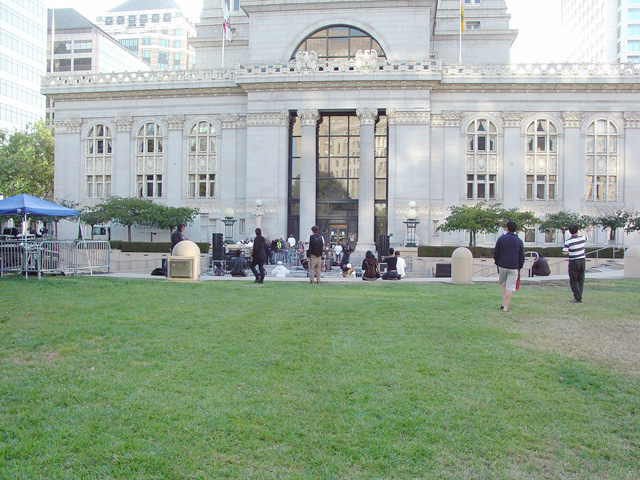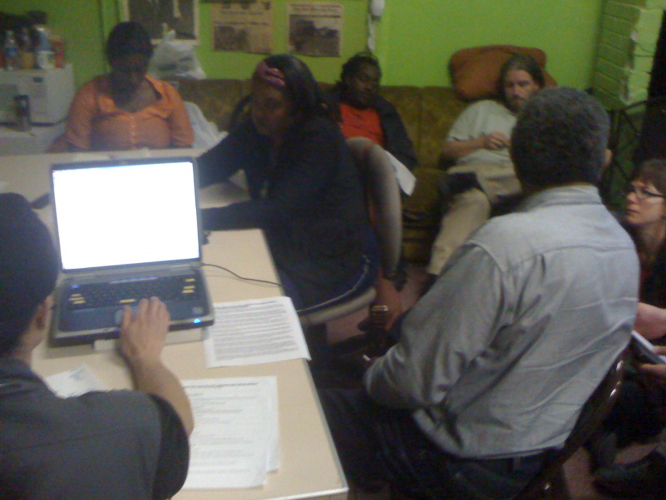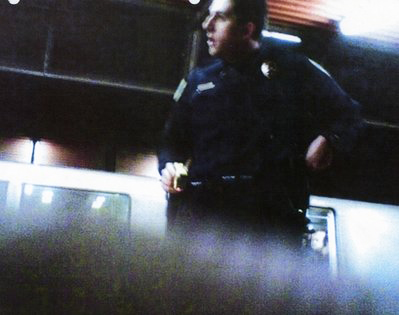A Celebration of the Justice for Oscar Grant Protesters
January 1, 2019, marks ten years since the murder of Oscar Grant by BART police officer Johannes Mehserle. In the lead up to this grim anniversary, a number of articles, multimedia pieces, radio programs, and television news segments have been produced to commemorate the occasion. Especially moving are those that give voice to Oscar's family and friends. But it's rare to see significant tribute paid to the fact that were it not for the vigor and relentlessness of protesters and activists, Oscar Grant would have received little to no justice.

The elephant in the room with the 10th anniversary pieces is what actually propelled the movement toward justice. Rebellions and protests are mentioned, typically as fascinating side stories, but not as the key driver behind the victories achieved. Then, as now, there is an ambivalence toward protesters and their tactics, at best, even as the establishment widely embraces Oscar Grant commemorations today.
I: No Justice, No Peace
"If there is no struggle, there is no progress.... Power concedes nothing without a demand. It never did and it never will."
— Frederick Douglass, 1857
Accountability and reform did not come because the "system worked" of its own volition. It was not a benevolent interest in equal justice for all that compelled the Alameda County District Attorney's office to prosecute Johannes Mehserle. It wasn't a sense of humility that led district attorney Tom Orloff, BART police chief Gary Gee, or BART general manager Dorothy Dugger to resign. It wasn't a culture of accountability at BART that caused officers Marysol Domenici and Tony Pirone to be fired.
It was clear and unequivocal demands from the people, issued militantly via street rebellions and, just as forcefully, in never-ending public meetings. The powers that be were dragged kicking and screaming every step of the way.
Rewind to early January 2009. Mehserle had resigned and fled to Nevada, BART was preparing their whitewash "investigation" vindicating everyone involved, and the DA's office was doing what it always does when police murder unarmed people, refusing to charge Mehserle.
Then came the January 7th rebellion. Pent up frustration with decades of racist police violence exploded across downtown Oakland.
Still, BART continued to push claims that officers had followed protocol and acted professionally, all the while concealing-until-subpoenaed a high-quality video they stole which revealed otherwise. BART had even initially lied that cameras on the Fruitvale station platform weren't capable of recording. And the agency continued to make absurd and offensive claims in their own defense for months and years after the killing.
But other powers that be were freaking out after January 7, and not just because police had largely lost control of the streets. A group of local Black clergy and organizers began a months-long pressure campaign on DA Orloff on January 7, hours before the city blew up. Mayor Dellums was pleading for calm and California Attorney General Jerry Brown called a press conference to push the DA to move quickly. Defiant youth-driven street demonstrations continued almost every day, and officials were scrambling to figure out what to do as the largest rally yet was scheduled for January 14.
Then, lo and behold, on January 13, Mehserle was arrested, and Oakland's powder keg was defused before it became a larger mass uprising. Wild street protests continued on January 14, and again on January 30 when Mehserle made bail, but didn't expand further in numbers or ferocity. (In the following years, Oakland would rise up several more times for Oscar Grant, and again during Occupy Oakland and in reaction to police murders such as those of Treyvon Martin and Mike Brown.)
Taking the fight from the streets to public meetings and the transportation infrastructure, BART board meetings and stations were shut down and otherwise disrupted. Relentless pressure was kept up on authorities to produce results.
Determined activists pushed for years, not taking "no" for an answer. BART was forced to create a civilian police oversight apparatus. In many ways it was exhausting, for activists as well journalists like myself doggedly covering events. I used to joke I'd never wish on anyone the insane number of BART meetings I had attended.
While victories were not absolute — Domenici was rehired, civilian oversight was undermined in back rooms, and Mehserle was only convicted of manslaughter — none of what was accomplished would have happened without the radical spirit of the protests and the intense long-term commitment.
The victories didn't come cheap. Hundreds of street fighters paid a big price for their commitment to justice, especially those who were jailed and/or charged with felonies. Court cases dragged on for years. A short documentary at the time broke down the situation arrestees faced and solidarity efforts to resist the state in court: "Hands Off Oakland Rebels."
Oakland police were the primary agency tasked with suppressing demonstrations. Physical and civil rights abuses against protesters by OPD ran rampant. Eventually, 152 "Justice for Oscar Grant" protesters were caught in an unlawful mass arrest by Oakland Police and a class action lawsuit was filed by the National Lawyers Guild. Protesters won over $1 million and court-enforced crowd control policy changes. Oakland police can no longer scoop up wide swaths of random protesters and send them all to jail.
The videos of Oscar Grant being shot in the back shocked the conscience of not only Oakland but the entire nation, in a way not seen since video of the Rodney King beating was broadcast on television news programs in 1991. Only this time, the video went viral online. When Oaklanders rose up in force and demanded accountability, leading to Mehserle becoming the first police officer in the history of California to be charged with murder for an on-duty shooting, people took notice across the U.S.
New possibilities in the struggle for equal rights and justice were in the air. And, just a few short years later, the Black Lives Matter movement was born after the killing of Trayvon Martin in Florida. The number of solidarity demonstrations in cities across the country was unprecedented, far surpassing those for Oscar Grant. After Ferguson rose up, then Baltimore, there was no turning back.
In California, after countless failures to even put a dent in the Police Bill of Rights, finally SB 1421 was passed, going into effect on January 1 along with other new laws such as SB 978, holding the real potential for considerably greater transparency and accountability for local police departments. It's hard to imagine such legislative progress had the people of Oakland not risen up for Oscar Grant ten years ago.
White supremacy remains well-entrenched, but a historic shift appears to be happening. Laws are changing, the number of police charged with crimes is growing, and more progressive district attorneys are being elected. There's still a long, long way to go, but the police impunity that seemed so intractable before January 1, 2009, became at least a little bit less so once Oaklanders stood up and seized the moment for Oscar Grant.
II: The Uphill Struggle
"You might murder a freedom fighter like Bobby Hutton, but you can't murder freedom fighting."
— Fred Hampton, 1968
What was accomplished in the Justice for Oscar Grant movement didn't come easy. From the get go, BART resisted the demands of the people. OPD eagerly jumped in to suppress demonstrations. The city of Oakland itself aligned with the non-profit industrial complex to undermine grassroots efforts to build community power. The forces aligned against the Justice for Oscar Grant Movement went all the way up to the federal government.
The corporate media was never an allie to the movement, and was more often than not friendly to Mehserle, creating sympathetic backstories for the killer cop. It was the corporate media that first bandied about the taser confusion defense for the murder. (Mehserle made no such claims at the scene or in the days afterward. Never mind that Merhserle drew his taser less than a minute before shooting Oscar in the back.) At times, it appeared the corporate media and BART were blatantly conspiring together against Oscar Grant's family and friends. Openly scoffing at protesters was not beyond the pale, neither was sneering at "fringe elements of the radical left."
The city of Oakland continually sought to undermine the movement, going so far as to schedule a counter event for the day of the Mehserle verdict, daring to call it a "community rally." The city didn't just promote its plans with press releases. OPD was sent into schools to discourage turnout for the real protest. The city offered bribes of around $30 to anyone who showed up at designated locations alternately called "cool off," "speak out," or "healing" centers rather than attend the real grassroots protest (hosting organizations received a stipend for each person they could lure onto their premises, as well). Later, as Mehserle's sentencing approached, the police chief recorded a "keep the peace" robocall that hit landline telephones in Oakland. Fortunately, the people weren't buying it and city-led events flopped miserably.
Amplifying these city-led efforts were non-profit organizations dependent on government funding to pay the large salaries of their directors. Collaborating NGOs hosted the "cool off" counter-protest centers and produced slick PSAs that equated property destruction with the murder of Oscar Grant. Knowing they would fail to siphon off considerable numbers from the real event, non-profits sent a number of compliant youth to the actual event with glossy fliers to parrot the establishment message that "violence is not justice" on the community's open mic. Non-profit representatives issued statements blaming public outrage or inciting a riot on Oscar's family, not to mention dishing out unending scorn for protesters.
And the non-profits weren't the only ones coming after the family. The mayor's people, BART, and OPD harrassed Oscar's family over planned first anniversary vigil events. Family members were called into multiple meetings where threats were made that they would be held personally responsible should anything pop off in the streets.
Beyond behind the scenes attempts by police to intimiate family and organizers, BART and Oakland police maintained a heavy presence at every Oscar Grant demonstration and march, and even the first few vigils. Plainclothes and undercover OPD officers often worked with snatch squads at rallies and marches. Reflecting the power of police in Oakland, one captain wrote that he would arrest any elected leaders involved in protests and that the new district attorney, Nancy O’Malley "is going to do whatever we ask."
Along with a keen interest in the activity of anarchists involved with the movement, references to an Uhuru Solidarity Movement meeting announcement at Niebyl Proctor Libray on Indybay was found in police records. A log by BART police notes falsely describes the announcement as militant and indicates that OPD was interested in sending "a mole or undercover team" to the meeting of Oscar Grant supporters.
Local police had plenty of assistance. State and federal law enforcement were significantly involved in monitoring the various Oscar Grant protests. The FBI provided intelligence to OPD on the movements of “black bloc” anarchists in downtown Oakland on the night of January 14, 2009. On July 8, 2010, agents from the Drug Enforcement Agency, United States Secret Service, the California Department of Justice were assigned to monitor protests. The state Bureau of Narcotics Enforcement and Bureau of Intelligence and Investigation were also involved.
The surveillance of the Oscar Grant protests extended beyond Oakland and San Francisco to Los Angeles Oscar Grant protests as well. While much is known about police suppression of the movement, the full scope of multi-agency law enforcement collaboration arrayed against the movement may never be known.
Demands were made of the Justice Department that proved fruitless. Community activists and Oscar's family repeatedly called for a federal prosecution of Mehserle by the U.S. Attorney General, as in the Rodney King case. Northern District of California U.S. Attorney Melinda Haag exploited these desires by bringing family and a few community members into her office in April 2011 prior to Mehserle's release to assure them that the Justice Department was actively monitoring the Mehserle case, that they needed to remain calm and be patient. (I had been invited to the meeting by others attendees, but the U.S. Attorney's office did not want a journalist present.) Similar meetings with other stakeholders were held, and the Justice Department's false assurances were passed on to the community. Of course, we know that the Justice Deparment did nothing to hold any bad actors accountable.
As a final antagonism to the movement mentioned here, defenders of Mehserle became publicly active for several months in 2010. The highpoint for the pro-police agitators was a July rally in Walnut Creek in response to Mehserle's conviction. They were outnumbered by Oscar Grant supporters 2-to-1. After Mehserle's brother hung a "Free Mehserle" banner on a sailboat outside San Francisco Giants games, Oscar Grant supporters flew their own banner in McCovey Cove during playoff games reading "Justice 4 Oscar Grant."
Despite the obstacles, Oakland's radical fight for justice proceeded of its own accord, asserted its right to assemble, and never sought permits from the city for any rally, protest, or march. The movement as a whole did not allow itself to be watered down or coopted. Aligned factions were not split apart by official attempts to define "good protesters versus bad" or by giving credence to recycled anti-civil rights tropes about "outside agitators." Protesters respected a diversity of tactics, maintained a separation of time and space when approaches diverged, and kept intra-movement disagreements largely out of the spotlight. (Essentially, acting in accordance with the "St. Paul Principles, even if not recognized as such.")
III: Unabashed (and All Too Often Uncredited)
"Everybody's talking about peace and we're still waiting on our justice."
— Karissa Shaw, 2010
The movement for justice for Oscar Grant was something of a motley mix of characters. Caring and committed, from many different walks of life, some more radical than others, with often seemingly incompatible politics. Anarchists were organizing with Black nationalists. Openly gay socialists worked alongside the Nation of Islam. Experienced activists both shared knowledge with and learned from fresh, angry rebels. Oscar's family was forced to deal with the intense emotions of having lost a loved one to police violence caught on camera, dealing with a notoriety no one would choose, while at the same time receiving a crash course in politics and social activism.
Not everyone always got along perfectly. Invariably, tensions flared, and often it was a productive part of the process. Everyone involved was passionate about achieving justice, but what exactly justice meant, what were the most effective tactics, and how far to push, those were questions requiring resolution again and again throughout. Analyses and critiques were written, even critiques of critiques.
Remember, the movement lasted for years. Invariably, some people moved on, while others showed up late to make new contributions. Many signed on for the entire ride, full tilt boogie. In the end, it worked, not always smoothly or as everyone would have wanted, but movement folks largely got done what needed to be done by the moment in time it needed to happen.
As movements achieve success, it it not uncommon for those who first stood up — those who may have offended polite society, those who took the most risks or paid the highest prices — to become overlooked as the history is written and commemorated. The tendency is for credit for social justice advances to land with politicians and other authority figures who only acted after popular pressure became too much to them to bear.
That's what took place when the excellent film Fruitvale Station premiered at the Grand Lake Theater. On the guest list for the private screening were politicians, BART's chief of police, and corporate media. Not invited were Oscar Grant's friends who were on the platform with him when he was murdered. Neither were most of organizers and community activists who fought long and hard for justice. It took deliberate behind the scenes advocacy to get Oscar Grant's friends into the show, and a community activist or two managed to insist successfully at the doors that they be admitted.
And so names will be named here, giving credit where credit is due. Some were central organizers, others more peripheral but in the game nonetheless. Some reported on events, some provided academic analyses. Every person or organization listed below contributed in one way or another, most often in far more ways than what the links might reveal. The people and organizations compiled here have never been recognized together in one place. This was the grassroots movement responsible for Oscar Grant victories...
Family
Central Organizing Committee Iterations
- Coalition Against Police Executions (CAPE)
- New Year's Movement for Justice
- No Justice No BART
- Community Council for Justice
- Oakland General Assembly for Justice for Oscar Grant
- Coalition for Justice for Oscar Grant
- Los Angeles Coalition for Justice for Oscar Grant
- ONYX
Supporting Organizations
- OneFam / Bikes 4 Life
- Oscar Grant Committee
- Bay Area anarchists
- Bay Area ISO
- REV Club
- ANSWER Coalition
- BAMN (By Any Means Necessary)
- Oakland 100 Support Committee
- Uhuru House
- Campaign to End the Death Penalty
- Black Riders Liberation Party
- Berkeley Copwatch
- WeCopwatch
- National Lawyers Guild, San Francisco Chapter
- UA in the Bay
- Bay Area IWW
- Black Dot Cafe & Marcel Diallo (venue)
- Humanist Hall (venue)
Town Halls (Town Halls for Justice for Oscar Grant ran weekly for two years)
Artists and Musicians
- Unity, RasCeylon, SinistaZ (live)
- Mista F.A.B.
- The Burners ft. Kev Choice & Bambu
- Beeda Weeda & J. Stalin
- G-Wet, Sleepy-D
- Native Guns
- Revolt rap
- Ragging Grannies
- Aesthetics Crew
- Musical performers at anniversary vigils
- Graffiti artists
Organizers, Activists and/or Independent Journalists
- Karina Vargas, Tommy Cross and Margarita Carazo, Daniel Liu and Jamil Dewar who recorded history-making video on the BART platform
- Dereca Blackmon
- Rachel Jackson
- Tony Coleman
- Cat Brooks
- Krystof
- Rekia Mohammed-Jibrin
- Andrea Prichett
- Tim Killings
- Jabari Shaw
- Gina
- Michael Walker, aka Ghetto Prophet
- Rasheed Shabazz / The Black Hour
- Gabe Meyers
- Fred Hampton Jr.
- Bakari Olatunji
- Forrest Schmidt
- Don Juan
- Dee Allen
- Kim Rohrbach
- Cameron Sturdevant
- Dana Blanchard
- Crystal Bybee
- Krea Gomez
- Reiko Redmonde
- Yvette Felarca
- Shanta Driver
- Wilson Riles Jr.
- Walter Riley
- Boots Riley
- Davey D & Hard Knock Radio
- JR Valrey & Block Report Radio
- Wanda Sabir
- Hannibal Shakur
- Gerald Sanders and Shane Salam, Radical Perspectives
- Andrew Stelzer
- Jesse Strauss
- Jonathan Nack
- ntuit
- Turha Ak
- Terri Kay
- Kristian Williams
- Sam Stoker
- George Ciccariello-Maher
- Raider Nation
- Advance the Struggle
- Ali Winston
- Oakland students
- Los Angeles students
- Thandisizwe Chimurenga
- Aidge Patterson
- Protesters in , Fresno, Los Angeles, across the country, and around the world
Independent Media Outlets
It's been ten years since the movement arose and burst into the consciousness of the nation, and undoubtedly I've neglected to mention some folks who directly contributed to the struggle. Some are inadvertent, but, to limit the scope of this piece, I simply could not include every person who ever organized an event or spoke at a Town Hall, protest, or press conference, or who contributed to Indybay's deep archive of Justice for Oscar Grant coverage. But, if you follow the links above, you'll run into a many more who were involved as well.
Apart from the folks named in this piece, there are thousands who shall remain nameless that rallied, marched, and raised their voices for justice for Oscar Grant, as part of organized actions or not. To everyone who joined in the fight, this is a celebration of you, what you accomplished, and the future victories for which you helped lay the groundwork.
Get Involved
If you'd like to help with maintaining or developing the website, contact us.
Publish
Publish your stories and upcoming events on Indybay.







